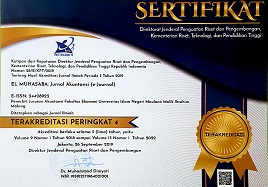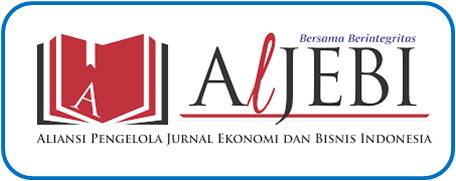PENGEMBARAAN AKUNTAN MENUJU KESADARAN SPIRITUAL: DILIHAT DARI PERSPEKTIF ONTOLOGI, EPISTEMOLOGI, DAN AKSIOLOGI
Abstract
Modern accounting that emphasizes material and value-free makes accounting toward materialistic, selfish, secularistic and atheistic. This is proven by the many cases of irregularities and manipulations of financial statements carried out by accountants that reflect those characteristics. Meanwhile human assumptions as an opportunistic, greedy and selfish homo economicus increasing this phenomenon. This become the big question to accounting science and the nature of accountants. Accounting as a branch of science has far away from the philosophy. The foothold of the science of accounting is to achieve the true nature of science and attain the ultimate truth of science. This study aims to review accounting from the perspective of ontology, epistemology, axiology and synergize the self-awareness of accountants in relation to humans, nature and God will bring accounting knowledge back to its essence and accountant to God so that accounting science will give benefit to humanity.
Keywords
Full Text:
PDFReferences
Bouckaerti, L & Zsolnai, L (2012) Spirituality and Business: An interdisciplinary Overview. Society and Economy 34 (2012) 3, pp. 489–514
Brophy,M (2015) Spirituality Incorporated: Including Convergent Spiritual Values in Business. Bus Ethics (2015) 132:779–794
Corner, P, D (2009).Workplace Spirituality and Business Ethics: Insights from an Eastern Spiritual Tradition. Journal of Business Ethics (2009) 85:377–389
Driscoll, C & McKee, M. Restorying a Culture of Ethical and Spiritual Values: A Role for Leader Storytelling. Journal of Business Ethics (2007) 73:205–217
Ewest, T,G (2015) Sociological, psychological and historical perspectives on the reemergence of religion and spirituality within organizational life. Journal of Religion and Business Ethics
Gotsis, G & Kortezi,Z (2008) Philosophical Foundations of Workplace Spirituality: A Critical Approach. Journal of Business Ethics (2008) 78:575–600
Krishna, A (2001). Ilmu Medis & Meditasi, Gramedia Pustaka Utama Jakarta
Kulik, Brian W (2005). Agency Theory, Reasoning and Culture at Enron: In Search of a
Solution. Journal of Business Ethics (2005) 59: 347–360
Mc Pherson, D (2015) Homo religiosus: does spirituality have a place in neo-Aristotelian virtue ethics?. Religious Studies (2015) 51, 335–346 © Cambridge University Press (2015)
Bouckaerti, L & Zsolnai, L. (2012). Spirituality and Business: An Interdisciplinary Overview. Society and Economy 34 (3), pp. 489–514.
Brophy, M. (2015). Spirituality Incorporated: Including Convergent Spiritual Values in Business. Business Ethics 132:779–794.
Corner, P, D. (2009). Workplace Spirituality and Business Ethics: Insights from an Eastern Spiritual Tradition. Journal of Business Ethics 85:377–389.
Driscoll, C & McKee, M. (2007). Restorying a Culture of Ethical and Spiritual Values: A Role for Leader Storytelling. Journal of Business Ethics 73:205–217.
Ewest, T, G. (2015). Sociological, Psychological and Historical Perspectives on The Reemergence of Religion and Spirituality within Organizational Life. Journal of Religion and Business Ethics.
Gotsis, G & Kortezi, Z. (2008). Philosophical Foundations of Workplace Spirituality: A Critical Approach. Journal of Business Ethics 78:575–600.
Kamayanti, A. (2016). Metodologi Penelitian Kualitatif Akuntansi, Pengantar Religiousitas Keilmuan. Jakarta selatan: Yayasan Rumah Peneleh.
Krishna, A. (2001). Ilmu Medis & Meditasi. Gramedia Pustaka Utama Jakarta.
Kulik, Brian W. (2005). Agency Theory, Reasoning and Culture at Enron: In Search of a Solution. Journal of Business Ethics 59: 347–360.
Mc Pherson, D. (2015). Homo Religiosus: Does Spirituality Have a Place in Neo-Aristotelian Virtue Ethics?. Religious Studies 51: 335–346. Cambridge University Press.
Meng, Y. (2016). Spiritual Leadership at The Workplace: Perspectives and Theories (Review). Biomedical Reports 5: 408-412, 2016408.
Pujol, N. Jobin, G. Beloucif, S. (2016). Spiritual Care is Not The Hospital’s Business’: A Qualitative Study on The Perspectives of Patients about The Integration of Spirituality in Healthcare Settings. Clinical Ethics.
Suriasumantri, Jujun S. (1993). Filsafat Ilmu: Sebuah Pengantar Populer. Jakarta: Pustaka Sinar Harapan.
Van Buren III, H.J. & Greenwood, M. (2013). The Genesis of Employment Ethics. Business Ethics 117:707–719.
William, C, S. (1997). Spirituality and Ethics: Exploring The Connections, Theological Studies; Mar: 58, 1; Research Library pg. 109.
DOI: https://doi.org/10.18860/em.v10i2.5855
Refbacks
- There are currently no refbacks.
Editorial Office:
Megawati Soekarnoputri Building
Accounting Department, Faculty of Economics
Jln. Gajayana 50 Telp (0341) 558881
E-mail: elmuhasaba@uin-malang.ac.id
Universitas Islam Negeri Maulana Malik Ibrahim Malang
E-ISSN 2442-8922
P-ISSN 2086-1249

This work is licensed under a CC BY SA 4.0 International License

















